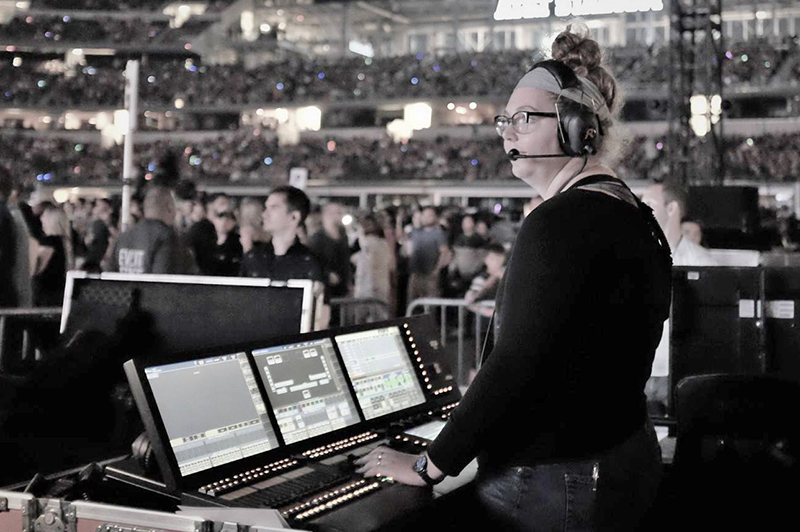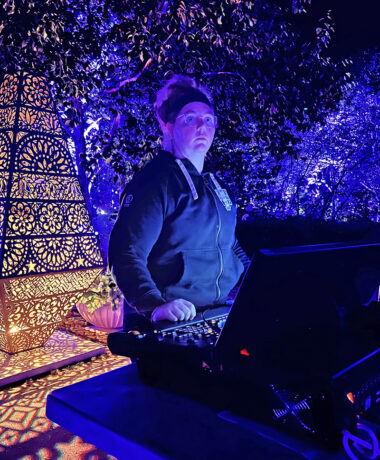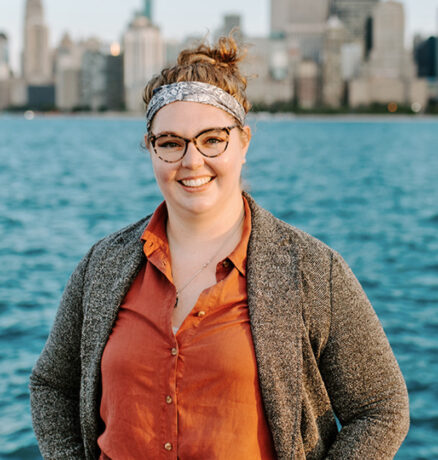
Since graduating from Arizona State University with a degree in Theater Design and Production, Hailey Featherstone is quickly adding titles to her multi-hyphenate credits, from Tech to Programmer, Lighting Director, and Lighting Designer. She has toured as Lighting Director for Hans Zimmer Live and Eddie Izzard and was an FOH Tech for a recent Taylor Swift tour and on the Paul McCartney tour. She is currently working as lead lighting designer for two garden projects—Kohl Children’s Museum in Glenview, IL and Forest of Lights at Fair Oaks Farms in Fair Oaks, IN.
How did you get your start in lighting and concert touring?
For me it was early exposure to the industry from it being the family business, [Hailey is the daughter of John Featherstone, Designer and Partner & Principal, at Lightswitch] so, I was really lucky to know that this was a viable career path from early on. It is an exciting, fast-paced kind of lifestyle, which is something that I’ve always found appealing. And lighting, in particular, has always been what I’ve really gravitated towards. For me it is an incredibly interesting form of creative expression. It is ever-changing and very fulfilling creatively.

What do you love most about your job?
The people who I get to work with and meet. I think that we’re really lucky in the entertainment industry to have some incredible people—from all different backgrounds—who approach this career in all different ways. I love hearing about people’s journeys, of how they got here and being able to learn from them. Coming back from the time away during Covid, being able to do what we love again, I am just even more grateful for the opportunity to do what I love, and to get to see the people that I missed so much during our time off. And as I said, I love that it’s such a unique form of creative expression. I really enjoy being able to explain my job to people; showing them what I get to do working with others. It is great when people notice how thought out our work is, how everything is a choice and once they start to pay attention to the atmosphere around them they notice how curated it is creatively.
Who have been some of your mentors?
Definitely, all the people at Lightswitch. I’ve been really lucky to have a sort of group of “aunts and uncles” there who have been really gracious and generous with their time. And obviously, John, my dad, and then Norm Schwab and a lot of the electricians and programmers who really helped me learn the ropes on things. Lacy Taylor, Jeff Johnson, who’s not with us anymore, and Dennis Connors, all people who took the time to teach me when I didn’t know anything. Mike Hosp was a big teacher and mentor for me. He was one of the people who taught me it is show business, not show friends, but in the nicest way possible. He really pushed me past what I thought I could do and was a great teacher for the “teamwork makes the dream work” sort of mentality. I really appreciate all the input I get from a lot of the people I work with, but those are the first ones that come to mind.

Were there particular things you think really set you on your career course?
I think a big one was having access to a pretty good fine arts program in my high school. Just being able to explore theater and dance was a big one for me. Getting to have experiences lighting dance really showed me how creative you could be with lighting. Being able to work with movement artists and play with the human form in that way was something that really set me on the path towards really knowing that lighting was what I wanted to do. Then also, I was lucky enough to work at Upstaging right out of college, that was hugely beneficial for me. I would send anybody I know who’s interested in the lighting and production world to go through what I think is essentially the best roadie bootcamp in the world—working at Upstaging.
What is an important skill or trait you feel you need for your job?
I think that the “all hands-on deck” mentality is something that’s really important. And never getting too big for your britches; always realizing that at the end of the day nothing would happen without everybody else in the room. It is all teamwork, so staying humble and respectful is a huge one. We’ve all seen people who get jaded by the industry, so I try, every day that I get to be on site, to take a minute to be grateful. I always think, ‘I can’t believe somebody pays me enough money for this to be my career.’
Is there a trend in the industry you really like at the moment?
We’re seeing a really interesting kind of swing towards slightly more simple, but very intent-fully designed lighting rigs. I think that’s really great. I am enjoying a lot of the interesting linear shapes that people are making with rigs. I think that the push towards being able to do interesting things with less, especially as the fixtures that we have access to can do more and more, creates a really interesting vibe and creative look for a lot of the rigs. Automation is still changing the game with how we can make shapes and do different things with lighting rigs and I love seeing the integration of automation more in the rigs. I also like that people are starting to incorporate practical elements back into lighting and production rigs; bringing practical scenic elements back into things to really create an environment.
Is there a piece of advice that you got at the start of your career you still follow?
There are two things: One is the famous David Bowie quote about staying creative and interested in your job is always about feeling like you’re floating in the water and your feet are just kind of touching the sand. Anytime you feel grounded, like you’re fully planted on the ground, it means you’re not doing anything interesting. So, always be pushing deeper. That’s a big one for me. And the other is from when I was first starting out and I was getting a little bit bogged down by ‘the boys club’ mentality. Sooner Routhier gave me a really good piece of advice; that the most important thing that you can do in any aspect of your job is just show up as you. The biggest thing is that you are there, and you are doing as kick-ass of a job as you possibly can. The second thing is that you’re going to be there to help support everybody else. And the third, or fourth thing, should be how you choose to present. And while it’s important that we always push for more inclusion and diversity in the industry, the most important thing should be that everybody that’s on the job has the initial respect of the fact that they deserve to be there, and that everybody is there to do the job as best they can.
What do you like to do when you’re not touring to recharge your creative batteries?
I love to cook. My partner and I both really enjoy cooking together. It’s something we do, in our free time. He is in the industry as well and we like to take the things that we see and eat in other places and try to bring that into our kitchen. I like the creativity that comes with cooking. Also, I love to go to museums and look at other people’s art. I get a lot of inspiration from just seeing cool things that other people are doing at all kinds of museums. I have really been enjoying science-based museums recently. And I love being outdoors, especially since we don’t get the opportunity to be outside quite as much as I’d like to be, doing what we do in this work.
With the path you’re on now, what direction do you want to head going forward?
My ultimate goal has always been to do lighting design and creative direction, but it’s always been super important for me to work through as many rungs going up the ladder to that as possible. Since I graduated college, I’ve focused on being a technician, being an electrician, learning and networking, and now transitioning more into programming, assistant designing, and even designing a few of my own projects. So, yeah, designing and creative direction but, in my experience, the best way to get there is to understand everything it takes to make informed and smart creative decisions.
The Parnelli NextGen series in PLSN spotlights up-and-coming live event professionals who have been making their mark on the industry. All of these talented individuals are also in the running for the “NextGen of the Year” Parnelli honor, which will be announced at the 21st Parnelli Awards ceremony in April 2023.


